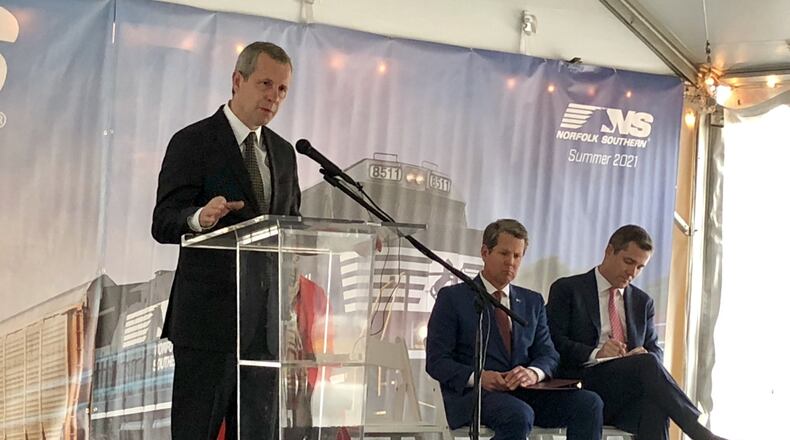Fortune 500 railroad giant Norfolk Southern held a ceremonial turning of dirt on Tuesday to mark construction of the company's new Midtown Atlanta headquarters, but the process of moving personnel from Virginia to Atlanta is already underway.
Jim Squires, the railroad company’s chairman and CEO, said more than 300 railway dispatchers have transferred to Midtown from elsewhere in the company’s network, and the company expects to move its first wave of about 100 corporate staff to Atlanta this summer.
Squires said Atlanta is a global logistics hub and a critical node for the railroad’s network. Corporate functions were divided between Georgia and Virginia and decision-makers needed to be in one place, he said.
Data analytics and machine learning are altering the way the company moves freight, he said, and the company wants to tap into Georgia Tech and the city’s technology talent.
“Many people associate freight railroads with a past industrial era,” he said. “But the trains going down our tracks today operate on technology that is as advanced and sophisticated as any industry anywhere.”
Squires said an additional 400 corporate employees will move to Atlanta when Norfolk Southern’s new $575 million headquarters opens in the third quarter of 2021. Norfolk Southern has more than 2,000 workers in Atlanta, and the relocation will increase that figure by 850.
Norfolk Southern formally announced its pick of Atlanta in December. Invest Atlanta, the city's development arm, that month approved $23.6 million in incentives for the new tower. State tax credits for newly created jobs will add millions more.
Gov. Brian Kemp and Mayor Keisha Lance Bottoms took turns praising the city and state’s cooperation in making the relocation happen.
The recruitment started a few years ago during the tenure of Gov. Nathan Deal when the city, state and developer CIM Group began discussing a plot of Norfolk Southern land in the Gulch, the weedy tangle of downtown parking lots and rail beds near Mercedes-Benz Stadium.
There, CIM plans to build an enormous mini-city of office towers, apartments, hotels and retail. The project could grow to $5 billion.
CIM wanted the land, and Norfolk Southern wanted to sell its holdings. Those talks later evolved into a headquarters recruitment.
But to consummate a deal, CIM wanted a historic and controversial public financing commitment to the Gulch deal of up to $1.9 billion, including decades of future sales and property taxes generated within the project site.
The City Council narrowly approved the financing package in November after months of intense debate, though a court proceeding needed to issue bonds for the project is being challenged.
“So much of what we’ve done in the past year has been about redeveloping our city,” Bottoms said after the ceremony. “When you bring corporate headquarters like Norfolk Southern to our city, we know they will bring c-suite jobs to the folks who will work in the mail room.”
About the Author
Keep Reading
The Latest
Featured





